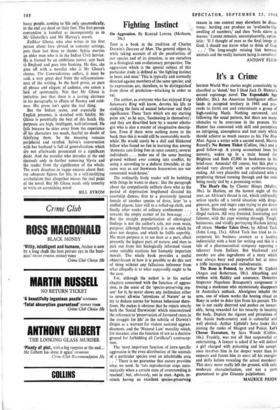Fighting Instinct
Tins is a book in the tradition of Charles Darwin's Descent of Man. The general object is, while taking account of all the peculiarities of our species and of its situation, to see ourselves in a biological and evolutionary perspective. The aggression which is the special subject of this particular study is defined as 'the fighting instinct in beast and man.' This is typically and normally directed against members of the same species; and its expressions are, therefore, to be distinguished from those of predation—attacking in order to eat.
The author, as everyone who has enjoyed King Solomon's Ring will know, devotes his life to studying the facts of animal behaviour and their significance. These 'facts which are my starting point are,' as he says, 'fascinating in themselves'; and they are described here by a master etholo- gist who is also a master of imaginative descrip- tion. Even if there were nothing more to the book than this it would still be memorably worth- while. He would surely be a dull and blinkered fellow who found no fun in learning that among 'domestic cats living free in open country, several individuals . . . make use of the same hunting ground without ever coming into conflict, by using it according to a definite timetable, in the same way as our Seewiesen housewives use our communal wash-house.'
The ordinarily lively reader will be bubbling with things he wants to share : like the paragraph about the compulsorily celibate dove who as the period of deprivation lengthened directed his courtship dances, first to a previously ignored female of another species of dove, later `to a stuffed pigeon, later still to a rolled-up cloth, and finally after weeks of solitary confinement . . . towards the empty corner of his box-cage . . But the straight popularisation of ethological findings is not the author's sole, nor even main, purpose; although fortunately it is one which he does not despise, and which he fulfils superbly. His main purpose is to see man as a part, albeit presently the highest part, of nature; and then to pick out from this biologically informed vision some suitably cautious but humanly important morals. The whole book provides a useful object-lesson in how it is possible to do this sort of thing without any fallacious inference from what allegedly is to what supposedly ought to be the case.
For, although the author is in his earlier chapters concerned with the function of aggres- sion, in the sense of the 'species-preserving rea- son' for it, he never shows any inclination either to invent all-wise `intentions of Nature' or to try to deduce norms for human behaviour there- from. He makes it obvious that he rejects utterly both the 'Social Darwinism' which misconstrued the reference to 'preservation of favoured races in the struggle for life' in the subtitle of Darwin's Origin as a warrant for violent national aggran- disement, and the 'Natural Law' morality which, for instance, cites the function of sex as a decisive ground for forbidding all ('artificial') contracep- tion.
The 'most important function of intra-specific aggression is the even distribution of the animals of a particular species over an inhabitable area . . .' There is no guarantee that nature provides what we need. In 'rats reproduction stops auto- matically when a certain state of overcrowding is reached'; but, obviously, not in man. Again, in- stincts having an excellent species-preserving reason in one context may elsewhere be disas- trous: herding can produce an 'avalanche-like swelling of numbers,' and then 'birds starve in masses.' Lorenz remains, uncomplacently, optim- istic: 'If I thought of man as the final image of God, I should not know what to think of God . . .' The long-sought missing link between animals and the really humane being is ourselves!
ANTONY FLEW


































 Previous page
Previous page